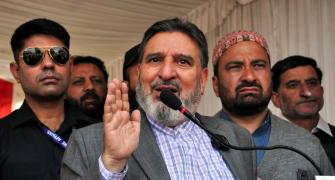Now, what's yet another luxury watchmaker like TAG Heuer doing in a country like India. The cheapest TAG Heuer costs about Rs 30,000. So while all its products may fit the common man's wrist, it will certainly be too big for his wallet.
TAG Heuer, the euro 548 million Swiss company, is part of the watches and jewellery division of luxury goods giant Louis Vuitton Moet Hennessy.
With brands like Christian Dior and Zenith under its umbrella, it has just opened its first exclusive showroom in India and about 10 more are planned by year end.
Is the timing right for TAG Heuer to enter Indian markets? It comes at a time when consumers are tightening purse strings and deferring purchases of luxury items. It also comes at a time when a bevy of high end watches have already been adorning shop shelves for some time now.
The company has done its market surveys and is convinced that there's a strong demand for the kind of products it sells.
"The luxury watches market in India records an annual growth rate of 10 per cent, which is an encouraging sign for us," says Jean-Christophe Babin, the company's President and CEO.
According to industry sources, approximately 30 million to 35 million watches are sold in India annually. The maximum growth comes from the Rs 2,000-5,000 segment, which is projected to sell 33 million units annually by 2005. But this market is growing at a 5 per cent to 7.5 per cent. '
In comparison, the luxury segment, defined as Rs 15,000 plus selling 100,000 units annually is charging ahead at 10 per cent to 15 per cent.
To capitalise on the growing demand, TAG Heuer will open exclusive showrooms in the big metros as well as other cities like Chandigarh and Hyderabad. Four boutiques have been inaugurated in the country since July last year and 10 more are planned by the year-end.
"By then, our total points of sale in India could go up to 40," says Babin. Its products also retail at multibrand outlets as well as shop-in-shops. Not an inordinately large number.
"We don't want to overdistribute," says the CEO confidently. "We don't need to; let the brand speak for itself."
If you think that smacks of smugness, consider the brand's legacy. Founded in 1860, Heuer quickly established itself in top-level sports competitions, a significant breakthrough coming in 1916 with the invention of the Micrograph -- the first sports timepiece capable of measuring time with an accuracy of 1/100 th of a second.
The brand was the official timekeeper for the Olympic Games through the 1920s and went from strength to strength thereafter. The launch of the Microtimer in 1966 made it the first watchmaker capable of mastering 1/1000 ths of a second.
In 1985 Heuer merged with the Geneva-based TAG (Techniques d'Avant-Garde) Group. In 1999, TAG was acquired by LVMH.
TAG Heuer entered the Chinese market a few years ago. Ravi Thakran, regional managing director for LVMH Watch & Jewellery, says the group saw very fast growth in China. "But India is a more complicated prospect," he adds.
Also, the company is keeping its ambitions in check. "We don't believe it's possible to make profits here within the first year. But we're willing to wait. The long-term picture is very encouraging," says Thakran. The company expects to sell 4,000 to 5,000 watches by the end of the year.
TAG Heuer isn't the first luxury watchmaker to open shop in India. Swatch is already selling brands like Breguet, Blancpain, Omega, Rado and Longines in the top-range segment, mainly through multi-brand outlets. G Kannan, country manager, Swatch Group India, claims his group dominates premium watch sales.
He says Swatch sales could exceed over 80 per cent of luxury watches sold in the country. "Our sales are expected to increase by 20 per cent this year," he adds.
But Babin is unconcerned about competition at this stage. "Our plan is not to eat into the existing market but expand it further," he says. Besides, he believes TAG Heuer has moved beyond being a brand and is now a category by itself.
"Our unique selling proposition (USP) is that we combine legitimacy with a dynamic edge," he says.
"Other brands have been around as long as we have and are equally well established, but we are constantly working on our products to ensure that they are relevant to today's customers."
TAG Heuer has entered the Indian market with the stated aim of making India one of the top 10 contributors for TAG Heuer worldwide. With the country placed as high priority, the brand will invest heavily in marketing and advertising.
"Our advertising spends will be need-based," says a company spokesperson. "The investment will run into a couple of crores, with a mix of print, TV and outdoor advertising."
So what kind of customer is the company targetting in the Indian context? "We're looking at determined young individuals, who want their watch to reflect their attitude to life. Mainly entrepreneurs between the ages of 25-40," says Babin.
The key word, it seems, is 'Achievers'. That's appropriate considering some of the brand ambassadors who have promoted TAG Heuer timepieces over the years.
Like suave actor Steve McQueen, tennis star Monica Seles and athletics queen Marion Jones. The latest addition to the list is golfing wizard Tiger Woods, who appears in the new "What are you made of?" corporate campaign. All these stars fit in with the brand's core values of prestige and performance.
But for all the high profile associations, isn't price a barrier for Tag Heuer? TAG Heuer watches in India will have price parity with the global market. The starting point is a small matter of Rs 29,000 and they go up to Rs 500,000.
At those prices, will the Indian response match Babin and Thakran's optimism? Time will tell.






